UK Covid inquiry in Scotland: Five things we learned in week three
- Published
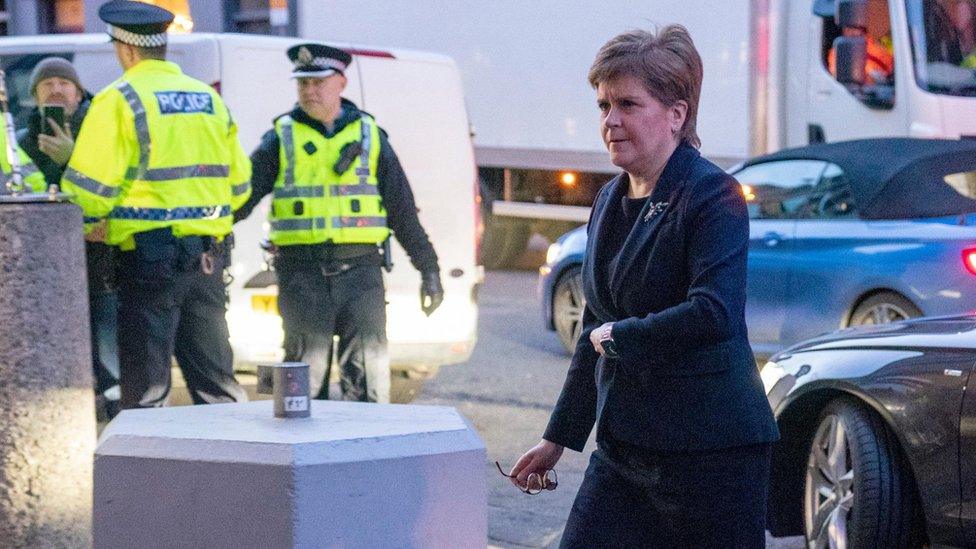
Senior politicians from both the Scottish and UK governments gave evidence to the UK Covid inquiry on its third and final week of hearings in Edinburgh. Here are five things we learned.
1. Who was playing politics during the pandemic?
Nicola Sturgeon responded robustly to charges that she politicised the pandemic to advance the cause of Scottish independence.
She'd never thought about the subject less in her life, she said, than while trying to steer the country through the crisis.
Ms Sturgeon insisted the suggestion she'd seen it as an "opportunity" to differentiate her leadership from the UK government's "just wasn't true", one of several moments when she appeared tearful.
The UK government minister responsible for relations between the two governments at the time, Michael Gove, was also challenged on constitutional matters.
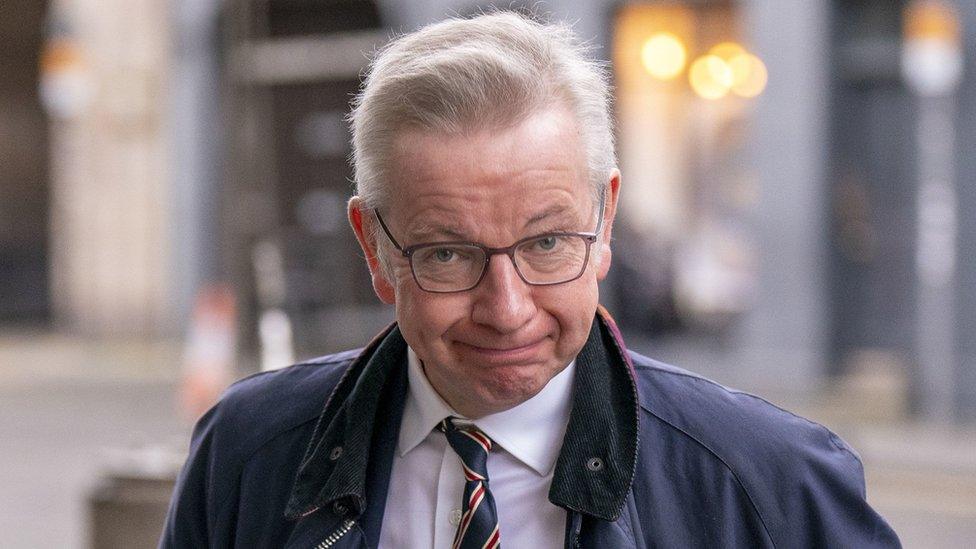
The inquiry was shown a paper Mr Gove presented to his colleagues in July 2020, called "State of the Union".
It contained notes on polling, indicating that voters in Scotland had a more positive view of the Scottish government's handling of the pandemic than they did of the UK government's response.
"Absent Covid-19," Mr Gove wrote, "I am firmly of the view that the risk to the Union would be the greatest challenge this government needed to confront."
He advocated highlighting how being part of the UK benefited people grappling with "hardship" brought on by the pandemic.
Two days later, the then-prime minister, Boris Johnson, visited Scotland.
Mr Gove, who was a journalist before entering politics, delivered an attention-grabbing line when he observed: "The political aim of the SNP is to destroy the United Kingdom, and from time to time they will make political points to that end."
But elsewhere in his evidence, he repeatedly stated his admiration for the professionalism and integrity of Scottish government ministers and his belief that their "overwhelming motivation" was to protect the people of Scotland.
It seems implausible that Ms Sturgeon, Mr Gove, or the governments they were part of entirely set aside their core political philosophies overnight when the pandemic hit. The real question for Lady Hallett is whether this made any real-world difference to the decisions they made.
2. Who was making the decisions in Scotland?
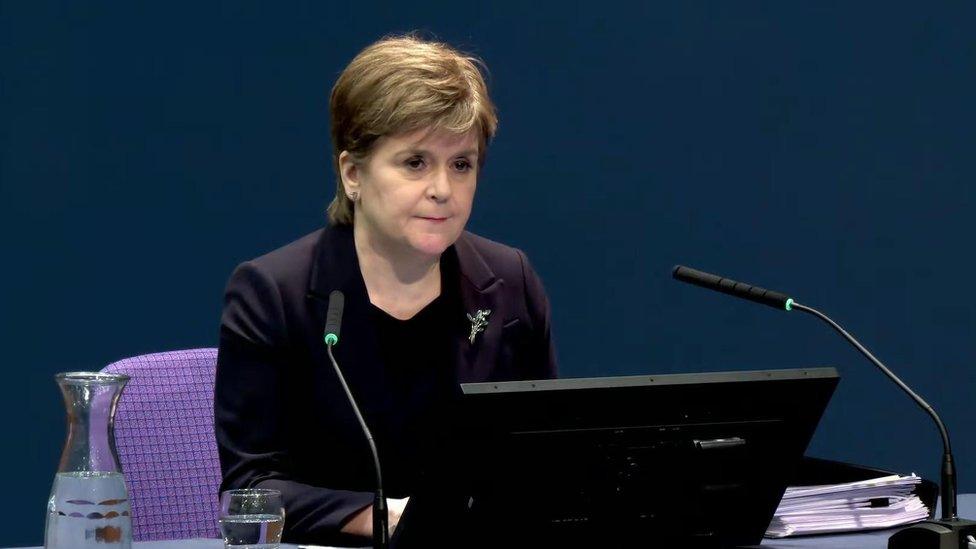
Was the Scottish cabinet in the driving seat when it came to deciding how to tackle the Covid pandemic or was power concentrated in the hands of a few?
Cabinet minutes dated December 2020 showed that ministers agreed to delegate to Ms Sturgeon the responsibility for finalising proposals to deal with the new Alpha variant of Covid.
The cabinet also agreed to give her and her deputy, John Swinney, the responsibility for further decisions if circumstances changed.
Mr Swinney said this was consistent with cabinet having set the direction. He also added said that some decisions during Covid had to be made quickly.
Mr Swinney was also asked whether a message from the national clinical director Prof Jason Leitch, which stated Nicola Sturgeon wants "to keep it small", was an indication that the former first minister in effect expected to take the decisions herself.
"The idea of it being a small cast list about who was discussing these points is not one I would accept," he said.
Ms Sturgeon also rejected this suggestion, pointing out that cabinet met around 100 times during Covid and that each time detailed minutes would record both the options assessed and decisions reached.
So called "Gold Command" meetings - involving Nicola Sturgeon, trusted advisers and a smaller revolving group of ministers - which met in the days ahead of cabinet were not, however, minuted, which means it's impossible to know what role "Gold" meetings played in decision making.
Ms Sturgeon denied she reached decisions based on her "instincts" and rejected suggestions she was given "carte blanche" by the Scottish cabinet.
3. Deleted WhatsApps still dominate discussions
How many times did we hear WhatsApp mentioned? The use of the app, what was said in those informal messages, and why they were or were not deleted have been recurring themes.
Former Deputy First Minister John Swinney said he deleted his manually. Alister Jack, the Scottish Secretary, said he had deleted all of his to free up memory on his phone.
For Nicola Sturgeon, the question of what happened to hers - after months of press speculation on the subject - eventually came down to one, six-word exchange.
Senior counsel to this phase of the Inquiry, Jamie Dawson KC, asked the former first minister: "But did you delete them?" She replied: "Yes".
She used WhatsApp with no more than a handful of people, she said, adding that the exchanges were only ever about "routine" matters or for "passing on information".
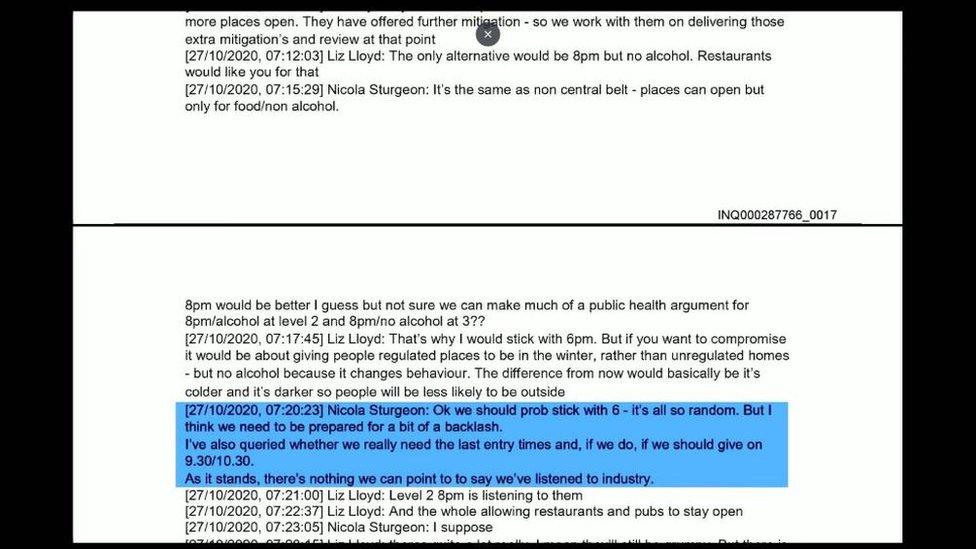
Much of the questioning focused on WhatsApp messages
But the inquiry was also shown messages between her and her senior adviser Liz Lloyd, discussing what Ms Sturgeon should do about what she described as "a bit of a crisis of decision-making" on policies affecting the hospitality sector.
The Scottish Covid Bereaved Group said they believed there was a culture of secrecy that continued to this day.
Ms Sturgeon's critics accuse her of a cover up. The former first minister insisted anything relevant to the business of government was recorded officially. The inquiry has to take her word for that.
4. The regrets about pandemic decisions
Another theme running through Nicola Sturgeon's five hours of testimony to the inquiry was regret.
Regret, inevitably, over the loss of life during the pandemic - particularly in care homes. And regret, too, over what she called the "loss of opportunity" when it came to education.
But the former first minister said her "chief" regret was not imposing the first lockdown - introduced on 23 March 2020 - one or two weeks earlier.
That will come as little surprise to those who observed Ms Sturgeon and her largely safety-first approach at close quarters throughout the pandemic:
Mask-wearing was mandatory for longer in Scotland than anywhere else in the UK. And at the start of the second wave there were harsher restrictions on entering each other's homes.
But when it came to locking down at the very start of Covid Ms Sturgeon acted at exactly the same time as the then Prime Minister Boris Johnson.
5. Did the right governments have the right powers?
Policy about health falls under the remit of the Scottish government. But there has always been a keen debate about how much economic policy is devolved.
The issue of furlough during the pandemic brought it into sharper focus.
When the third wave of Covid hit, Kate Forbes, who was the Scottish government's finance secretary, repeatedly requested that furlough, which was decided by the UK Treasury, be extended or reintroduced.
One of her officials told her there was no appetite for this in the Treasury; that the reaction to this suggestion had been allergic.
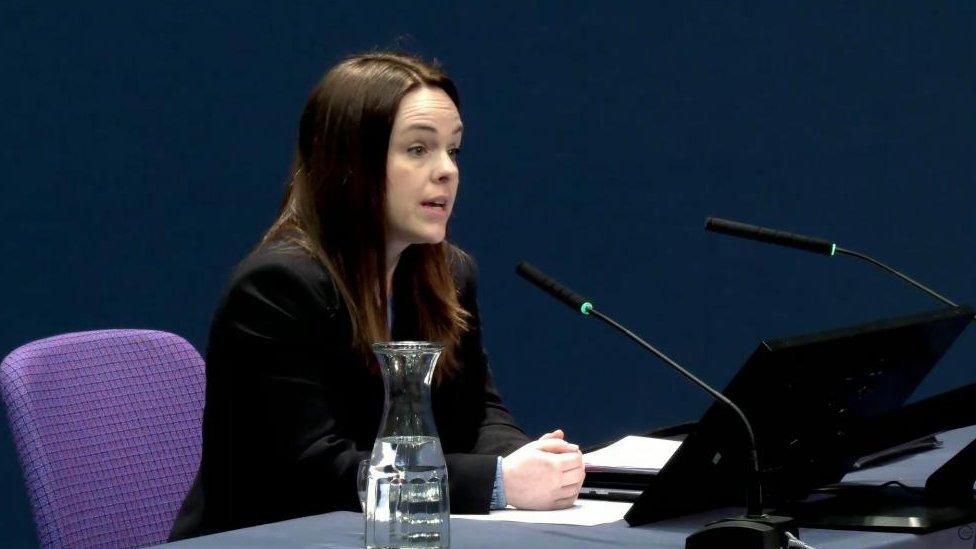
Ms Forbes said she believed Treasury officials were speaking "honestly and truthfully" at the times when they said no further funding would be forthcoming but the position changed shortly afterwards.
She said "it was largely because they didn't know rather than that they were being deceptive".
When asked, she agreed that it was a failure of the UK government to communicate the change to its own officials.
The former finance secretary also said she thought the UK mechanism for allocating money back to the Scotland government, known as the Barnett formula wasn't flexible enough to deal with an emergency.
In his evidence, Michael Gove stated that he believed there was a case for "greater clarity overall about reserved and devolved responsibilities".
The inquiry also heard evidence that Matt Hancock, the then UK secretary of state for health, thought public health matters such as "fat fighting" were devolved while public health emergencies were for the Westminster government to decide.
Mr Gove rejected suggestions that Mr Hancock's views were indicative of a wider attitude within the UK government but went on to say that some within the UK government occasionally found it "irksome" dealing with devolved governments taking a different view.